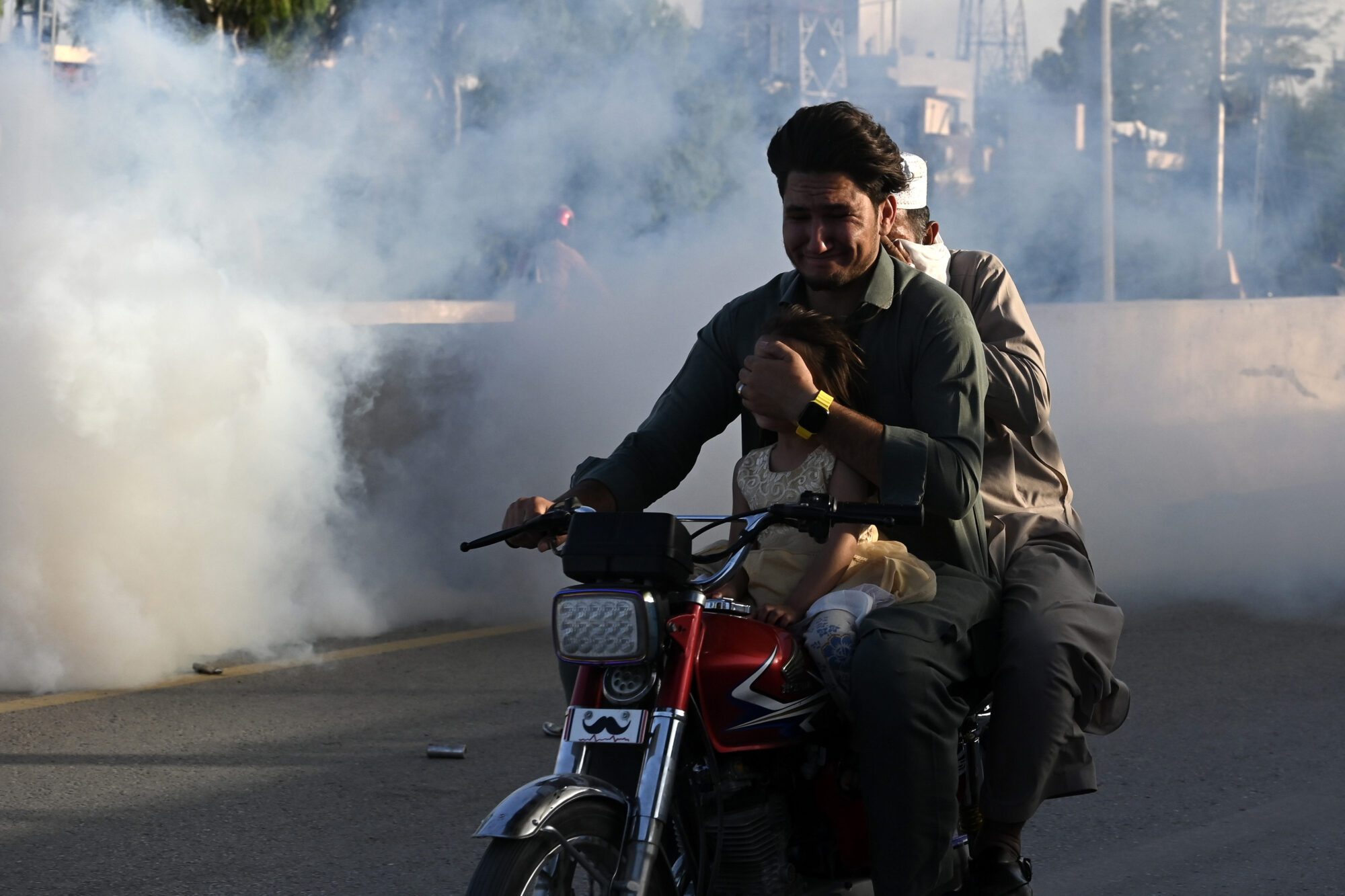
A motorcyclist covers his daughter’s face as he rides past teargas fired by police at Pakistan Tehreek-e-Insaf (PTI) party activists and supporters of Pakistan’s former Prime Minister Imran Khan.
Abdul MAJEED / AFP
Many thousands of angry supporters took to the streets across Pakistan following the arrest of former Prime Minister Imran Khan on Tuesday, May 9th. On Wednesday, the volatile situation showed no sign of abating, counting five dead as a direct result of the protests.
Ahead of Khan’s arraignment in the Pakistani capital of Islamabad on corruption charges, thousands of police were deployed and put on high alert, while any kind of assembly was pronounced illegal.
According to police reports, on Wednesday, protesters, unswayed by the authorities’ warnings, were pelting rocks and petrol bombs at police.
During protests in Punjab, Pakistan’s most populous province, about a thousand people have been arrested. Many were injured in the turmoil, including at least 157 police officers. Dozens of police cars have been set ablaze.
The army has now been deployed, at the request of two of Pakistan’s four provinces—Punjab and Khyber Pakhtunkhwa, both Khan strongholds—and the federal capital of Islamabad.
On Tuesday, Khan supporters had stormed several military buildings while setting fire to other state buildings. A number of schools have been shut down, access to social media restricted, and major roads closed.
Following his arrest on Tuesday, Khan, 70, has been turned over to Pakistan’s anti-graft body, the National Accountability Bureau (NAB), and is to remain in custody for eight days in a police guest house in Islamabad.
Khan—a celebrated cricket player before his rise to prominence in Pakistan politics—can still count on a large number of sympathizers, mainly within his Tehreek-e-Insaf (PTI) party.
While he has been arrested on land fraud charges, his supporters believe the arrest was politically motivated, and that he was ‘kidnapped’ by the government to make it impossible for him to run for office again.
Earlier on Wednesday, Khan appeared before a court that indicted him on charges of having unlawfully sold expensive state gifts during his four year-tenure as PM—a case unrelated to the one involving alleged land fraud.
These accusations of corruption are but two of over 100 registered against Khan since he left office last year. A conviction for most of these charges would bar Khan from holding public office.
Before his arrest—which he anticipated—Khan, who had been the victim of two attempts on his life in the last few months, had filmed a video. In it, he declared that what was currently happening was not because he had broken any laws but because he was “fighting for freedom,” which the “corrupt groups” with their “imported government which had been forced on us” wanted him to stop doing.
He went on to launch an appeal to all who care about their rights and freedom “to come out in the streets,” and that “the time has come for us to take our freedom.”
Before he was arrested Imran Khan recorded this video calling on people to come out into the streets in the event of his incarceration.
— INDEPENDENT PRESS (@IpIndependent) May 9, 2023
🔴 English Subtitles#ImranKhan #Pakistan #PakistanArmy pic.twitter.com/TwRUd4QPSB
In the meantime, Khan’s party, the PTI, posted a video on Twitter, making the same appeal to Pakistanis so they would “come out and defend their country now,” and that now is the time to change it, “or else the future is dark.”
It’s time to change Pakistan, or else the future is dark. Pakistanis must come out and defend their country now! #ImranKhan pic.twitter.com/2RyKGaQR1n
— PTI (@PTIofficial) May 10, 2023
The recent developments in Pakistan were met with the UN’s concern.
Deputy UN spokesperson Farhan Haq said on Wednesday that UN Secretary-General Antonio Guterres wants all parties in Pakistan to refrain from violence and stresses the need to respect the right to peaceful assembly.
Guterres had also urged Pakistani authorities to “respect due process and the rule of law in proceedings” against Khan.
Speaking from Islamabad to Al Jazeera, Maleeha Lodhi, Pakistan’s former ambassador to the UN, said it was “probably the most serious political and constitutional crisis that Pakistan has faced in many, many decades.”
Citing the “serious” economic crisis Pakistan currently is in, Lodhi called it “a perfect storm.”
With record high inflation, the nuclear-armed country faces default unless it receives massive financial aid—which, in the short term, it is unlikely to receive, since an IMF bailout has met with a six-month delay.
Khan was prime minister of Pakistan from 2018 to 2022, when he was ousted after having lost a no-confidence vote, due to his coalition allies having abandoned him.
Furthermore, he lost the support of Pakistan’s powerful military which historically exerted considerable influence on the country’s politics. Following his leaving office, several criminal cases, including involvement in fraud, were filed against him.
On the international stage, Khan was a respected figure, yet did not endear himself to the West (the U.S. in particular) because of his desire to pursue an independent foreign policy.
Last year, during a live televised address in the run-up to the no-confidence vote, he claimed Washington had “threatened” him in a letter and was conspiring—with his political opponents’ aid—against him in order to remove him from office.
Earlier in 2022, he had gone against Washington’s wishes by visiting Russian President Vladimir Putin in Moscow on the same day the latter had launched his ‘special military operation’ in Ukraine.
